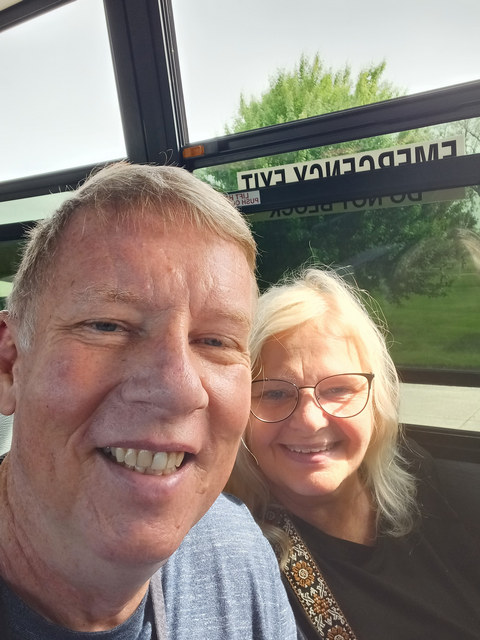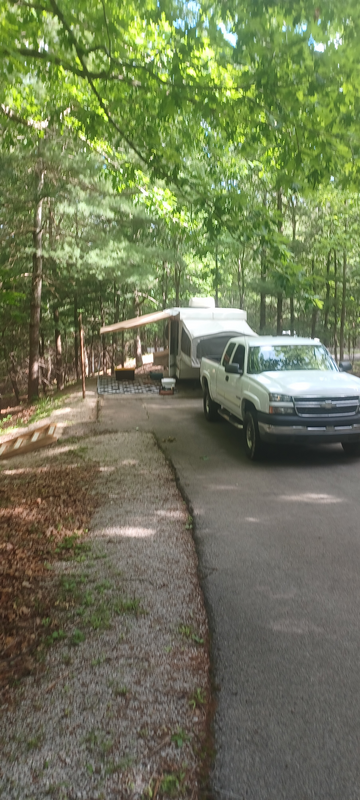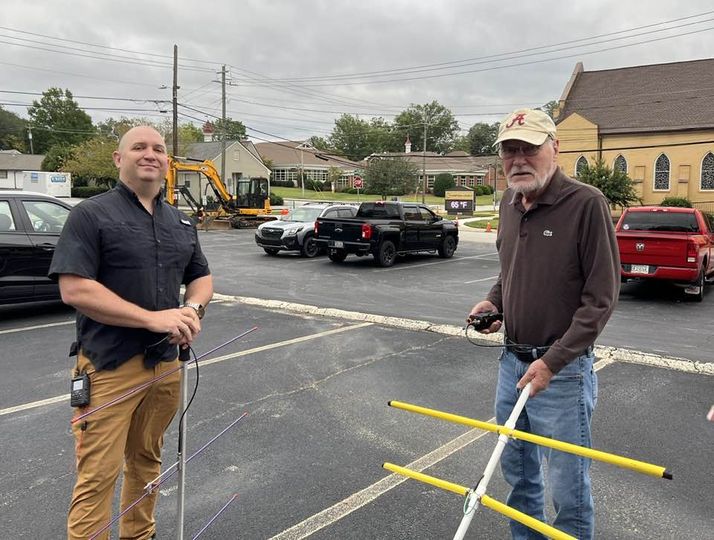WGARS 2025 Raffle!
- 20 October 2025
- West Georgia Amateur Radio Society
This email address is being protected from spambots. You need JavaScript enabled to view it.
This email address is being protected from spambots. You need JavaScript enabled to view it.
 The West Georgia Amateur Radio Society will hold its third annual “Villa Rica Gold Rush” special event September 27th, 2025 using the W4G Call Sign on 15,20,40, and possibly 80 meters in CW, Phone, and Digital modes. Operation on all modes and bands, including the 10 meter “bonus band”, will occur on September 27<sup>th</sup> from 12:30Z until 19:30Z from the original Pine Mountain Gold Mine Operations Building at the Pine Mountain Gold Museum in Villa Rica, GA. W4G will operate outside those hours using bands and modes chosen by our individual operators.
The West Georgia Amateur Radio Society will hold its third annual “Villa Rica Gold Rush” special event September 27th, 2025 using the W4G Call Sign on 15,20,40, and possibly 80 meters in CW, Phone, and Digital modes. Operation on all modes and bands, including the 10 meter “bonus band”, will occur on September 27<sup>th</sup> from 12:30Z until 19:30Z from the original Pine Mountain Gold Mine Operations Building at the Pine Mountain Gold Museum in Villa Rica, GA. W4G will operate outside those hours using bands and modes chosen by our individual operators.
Certificates for making a single contact, all bands, all modes, and bonus band contacts will be made available. When the event begins we'll put up a status page which will include the operators and bands they are operating on, as well as recent contacts. Please note that some operators will manually log their contacts and may not immediately appear on our status page. Certificates are normally available within moments of making contact, however it may take up to 24 hours for digital and manually logged contacts.
Keep your eyes to the sky (as well as this website and facebook) for the upcoming WGARS Balloon Launch. This will be a weather balloon with a payload containing APRS, a Fox, and assorted sensors and cameras. The challenge here is to track the balloon on its ascent and descent to retrieve the payload. These balloons generally rise and travel for approximately two hours. Then when reaching their critical altitude (which is determined by the pressure inside the balloon vs. the pressure outside the balloon and around 110,000 feet) they burst and parachute down for approximately an hour. Now we need to go get it!
The launch is slated for Saturday July 26th. The launch site is yet to be determined. Check back here for more details.
Recently, my wife and I were on a camping trip/Hamvention/family visit adventure. This adventure took us to Buck Creek State Park in Clark County, Ohio during spring thunderstorm season. Thursday night May 15th and Friday May 16th were beautiful southern Ohio spring day’s. Temps in the high 70’s with a  nice breeze and a few scattered clouds. While at the Hamvention on Friday, I spoke with a gentlemen who was part of the local skywarn network. I made the smart remark that I hoped his services wouldn’t be needed anytime soon, only to hear his reply of “definitely will get called out tonight.” He indicated we all might need to hunker down for what lay ahead that evening.
nice breeze and a few scattered clouds. While at the Hamvention on Friday, I spoke with a gentlemen who was part of the local skywarn network. I made the smart remark that I hoped his services wouldn’t be needed anytime soon, only to hear his reply of “definitely will get called out tonight.” He indicated we all might need to hunker down for what lay ahead that evening.
The day passed without incident and continued to be quite balmy into the evening. During our evening meal, my wife and I checked in with the national weather service via NOAA weather radio to hear that our calm spring day was going to go out with a bang starting around 8:00 p.m.. Heavy winds, baseball size hail, and downpours were expected. Did I mention we were in a pop-up tent camper? All I could envision was spinning around in the camper like Dorothy’s house on The Wizard of Oz just wondering where we would land.

The NOAA weather radio gave us the heads up we needed to secure our campsite. We rolled up the awning, brought in lawn chairs, coolers, and a few raccoons (probably not the raccoons) so they wouldn’t beat us to Oz. As 0800 p.m. drew nearer, the skies began to darken and the winds started to pick up. Being unfamiliar with the area I got on google to search for a local repeater. It was very fortunate that when I searched for Clark County, Ohio skywarn frequencies a number of them came up. As with repeater directories, the information wasn’t rock solid, but after searching through those that google produced I was able to find the local skywarn net on 146.73 Mhz.
The local net was up and running with a very efficient net control. The net control would give weather updates every 10 to 15 minutes, review the types of reports the net was looking for, and take additional check-ins. What really struck me was the decorum in which the net was run. Stations checking in were following the outlined net protocol and keeping their reports short and sweet. The net was also very descriptive about where the reports were coming from. For me, being unfamiliar with the area, this was great! This also was NOT a linked net with reports coming in from hither thither and yon. They were reports specific to the area.
Some have asked, “did you participate in the net?” No, I did not check in. While as a ham it was very difficult to not key the microphone and tell the net about the rain, or the lightning, or the blister on my toe from walking at the hamfest all day; my unfamiliarity with the area and repeater coverage kept me on the listening side of things. What? A ham on the listening side of things? That’s as ludicrous as reading the owners manual when you get new gear! Actually, I find that God gave me two ears and one mouth. While I don’t always practice it, I think this is a hint that we are supposed to listen twice as much as we talk. It was very beneficial to just stay on the listening side of things, although I’m certain I would have been welcomed.
I hope this is beginning to sound familiar. Locally we practice, and we practice, and we practice. Sometimes we seem very formal (using standard phonetics, giving your name and your location, make your reports be specific, etc). As someone on the outside looking in, I really appreciated this nets formal structure. The way this net described where in the county things were happening (using towns as landmarks, eastern part of the county, northern part, etc) was veryb helpful. This is definitely something we should try to adopt.
Fortunately for us, the storm passed over the period of about two hours, with one more wave later that night. No damage, no trip to Oz, and no holes in the canvas from baseball size hail.
What were my lessons learned?
1. Continue to practice.
2. Formal is okay even though we are volunteers.
3. Listen to instructions.
4. You never know who is listening and gaining benefit from your net.
5. Make sure people can find the net through search engines.
6. An un-linked net has great benefits (it’s also less likely to turn into a three ring circus)
7. Even though I want to push the button and talk...so everyone will know it’s starting to rain… I must LISTEN, LISTEN, LISTEN!

Winter Field Day [January 25th & 26th, 2025] is just around the corner. It is always on the last full weekend of January, beginning at 16:00 UTC on Saturday and running through 21:59 on Sunday. If you have participated in several Field Day club events, you may think there is no reason to prepare. Well, you are wrong!
Read more ...Every Thursday evening, the West Georgia Amateur Radio Society (WGARS) repeater hosts the Carroll County ARES training Net at 8:00 p.m. EST on the W4FWD repeater, on a 146.640 Mhz frequency, with a negative offset and a 131.8 Hz sub-audible tone. These nets provide our club with an abundance of information, operating techniques, and ways to improve our radio skills when operating over the repeater or as a participant in a net. During the net, those participating are able to ask questions, bring up issues related to ARES and EMCOMM, or ask questions related to the Amateur Radio world.
 On this past ARES Net, December 26, 2024 ARES Emergency Coordinator (EC), WX4BK, went over several important communication skills, radio
On this past ARES Net, December 26, 2024 ARES Emergency Coordinator (EC), WX4BK, went over several important communication skills, radio
Well, the results are in......nominations were slim...your present officers of 2024 will be back for another year in 2025. This includes:
President - WD8LQT, John
Vice President - KM4WQC, Matt
Secretary Treasurer - KM4UPX, Brian
Read more ...So what’s been going on with WGARS this fall you ask? It can be described in one word – Lots! Activities have included a high altitude balloon launch and chase, two stage fox hunt, POTA (Parks on the Air) operation at Mt. Cheaha and an organized NVIS (Near Vertical Incident Skywave) experiment. Since we have already reported on the balloon launch/chase and NVIS Exercise, this article will serve as a run-down of some of the other activities.
The Fox Hunt – September 28, 2024.
Read more ... No, we're not hunting a real fox! Our fox is a radio transmitter strategically hidden by "Team Veal" somewhere in West Georgia for us to locate. Fox hunting lets us improve our skills at everything from finding downed aircraft to missing persons to malfunctioning transmitters. But in reality, its just fun!
No, we're not hunting a real fox! Our fox is a radio transmitter strategically hidden by "Team Veal" somewhere in West Georgia for us to locate. Fox hunting lets us improve our skills at everything from finding downed aircraft to missing persons to malfunctioning transmitters. But in reality, its just fun!
Almost two dozen amateur radio operators converged at First Christian Church on College Street in Carrollton, GA on Saturday morning (September 28th, 2024) to be given the frequency the fox is set to and for the hunt to begin!
Most of the operators located the fox before lunch time. As is customary, we took advantage of the time to congregate for a meal after the hunt was over1
| Mon Nov 03 @ 8:00PM Club Net on 146.640mhz |
| Thu Nov 06 @ 8:00PM Carroll ARES Net |
| Sat Nov 08 @10:00AM NVIS Exercise |
| Mon Nov 10 @ 8:00PM Club Net on 146.640mhz |
| Thu Nov 13 @ 8:00PM Carroll ARES Net |
| Sat Nov 15 @ 9:00AM Monthly Informal Breakfast |
| Mon Nov 17 @ 8:00PM Club Net on 146.640mhz |
| Thu Nov 20 @ 8:00PM Carroll ARES Net |
| Mon Nov 24 @ 8:00PM Club Net on 146.640mhz |
| Thu Nov 27 @ 8:00PM Carroll ARES Net |
| X-Ray: GeoMagnetic: |